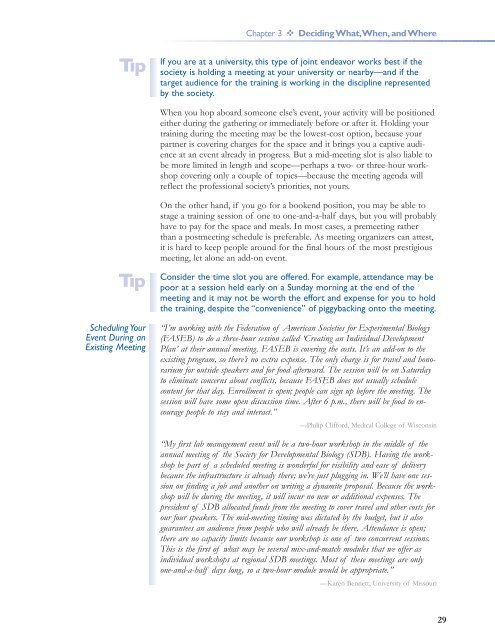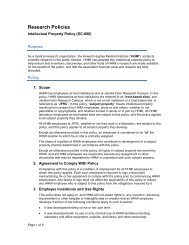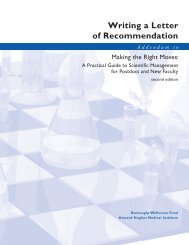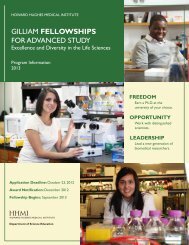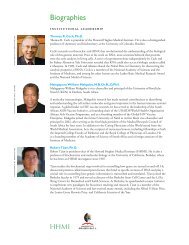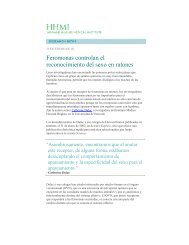Training Scientists to Make the Right Moves - Howard Hughes ...
Training Scientists to Make the Right Moves - Howard Hughes ...
Training Scientists to Make the Right Moves - Howard Hughes ...
You also want an ePaper? Increase the reach of your titles
YUMPU automatically turns print PDFs into web optimized ePapers that Google loves.
At a Glance<br />
At a Glance<br />
“”<br />
QA<br />
Chapter 3 Deciding What,When, and Where<br />
If you are at a university, this type of joint endeavor works best if <strong>the</strong><br />
society is holding a meeting at your university or nearby—and if <strong>the</strong><br />
target audience for <strong>the</strong> training is working in <strong>the</strong> discipline represented<br />
by <strong>the</strong> society.<br />
When you hop aboard someone else’s event, your activity will be positioned<br />
ei<strong>the</strong>r during <strong>the</strong> ga<strong>the</strong>ring or immediately before or after it. Holding your<br />
training during <strong>the</strong> meeting may be <strong>the</strong> lowest-cost option, because your<br />
partner is covering charges for <strong>the</strong> space and it brings you a captive audience<br />
at an event already in progress. But a mid-meeting slot is also liable <strong>to</strong><br />
be more limited in length and scope—perhaps a two- or three-hour workshop<br />
covering only a couple of <strong>to</strong>pics—because <strong>the</strong> meeting agenda will<br />
reflect <strong>the</strong> professional society’s priorities, not yours.<br />
Chapter One<br />
At a Glance<br />
On <strong>the</strong> o<strong>the</strong>r hand, if you go for a bookend position, you may be able <strong>to</strong><br />
stage a training session of one <strong>to</strong> one-and-a-half days, but you will probably<br />
have <strong>to</strong> pay for <strong>the</strong> space and meals. In most cases, a premeeting ra<strong>the</strong>r<br />
than a postmeeting schedule is preferable. As meeting organizers can attest,<br />
it is hard <strong>to</strong> keep people around for <strong>the</strong> final hours of <strong>the</strong> most prestigious<br />
meeting, let alone an add-on event.<br />
Consider <strong>the</strong> time slot you are offered. For example, attendance may be<br />
poor at a session held early on a Sunday morning at <strong>the</strong> end of <strong>the</strong><br />
meeting and it may not be worth <strong>the</strong> effort and expense for you <strong>to</strong> hold<br />
<strong>the</strong> training, despite <strong>the</strong> “convenience” of piggybacking on<strong>to</strong> <strong>the</strong> meeting.<br />
Scheduling Your<br />
Event During an<br />
Existing Meeting<br />
“I’m working with <strong>the</strong> Federation of American Societies for Experimental Biology<br />
(FASEB) <strong>to</strong> do a three-hour session called ‘Creating an Individual Development<br />
Plan’ at <strong>the</strong>ir annual meeting. FASEB is covering <strong>the</strong> costs. It’s an add-on <strong>to</strong> <strong>the</strong><br />
existing program, so <strong>the</strong>re’s no extra expense. The only charge is for travel and honorarium<br />
for outside speakers and for food afterward. The session will be on Saturday<br />
<strong>to</strong> eliminate concerns about conflicts, because FASEB does not usually schedule<br />
content for that day. Enrollment is open; people can sign up before <strong>the</strong> meeting. The<br />
session will have some open discussion time. After 6 p.m., <strong>the</strong>re will be food <strong>to</strong> encourage<br />
people <strong>to</strong> stay and interact.”<br />
—Philip Clifford, Medical College of Wisconsin<br />
“My first lab management event will be a two-hour workshop in <strong>the</strong> middle of <strong>the</strong><br />
annual meeting of <strong>the</strong> Society for Developmental Biology (SDB). Having <strong>the</strong> workshop<br />
be part of a scheduled meeting is wonderful for visibility and ease of delivery<br />
because <strong>the</strong> infrastructure is already <strong>the</strong>re; we’re just plugging in. We’ll have one session<br />
on finding a job and ano<strong>the</strong>r on writing a dynamite proposal. Because <strong>the</strong> workshop<br />
will be during <strong>the</strong> meeting, it will incur no new or additional expenses. The<br />
president of SDB allocated funds from <strong>the</strong> meeting <strong>to</strong> cover travel and o<strong>the</strong>r costs for<br />
our four speakers. The mid-meeting timing was dictated by <strong>the</strong> budget, but it also<br />
guarantees an audience from people who will already be <strong>the</strong>re. Attendance is open;<br />
<strong>the</strong>re are no capacity limits because our workshop is one of two concurrent sessions.<br />
This is <strong>the</strong> first of what may be several mix-and-match modules that we offer as<br />
individual workshops at regional SDB meetings. Most of <strong>the</strong>se meetings are only<br />
one-and-a-half days long, so a two-hour module would be appropriate.”<br />
—Karen Bennett, University of Missouri<br />
29


